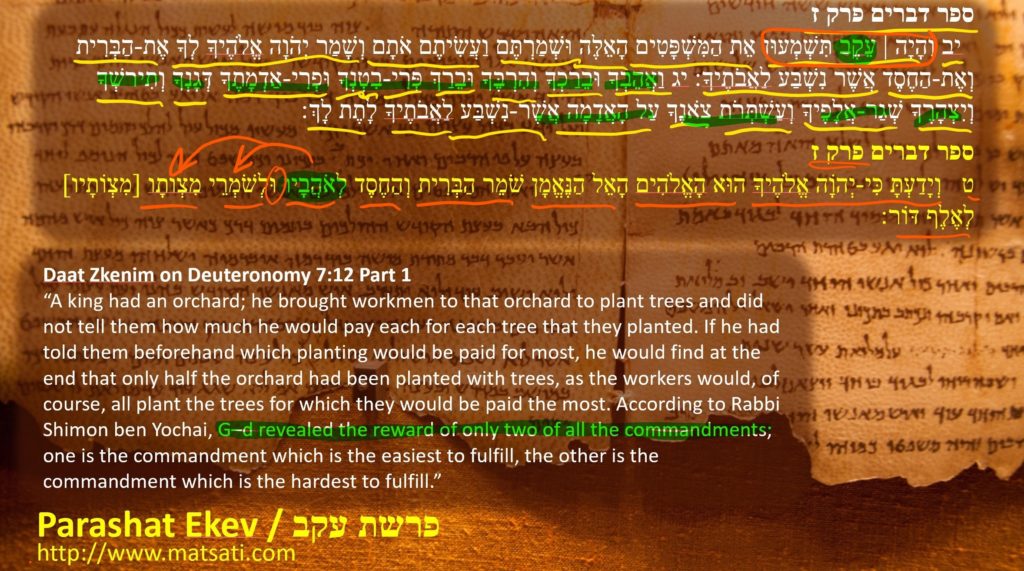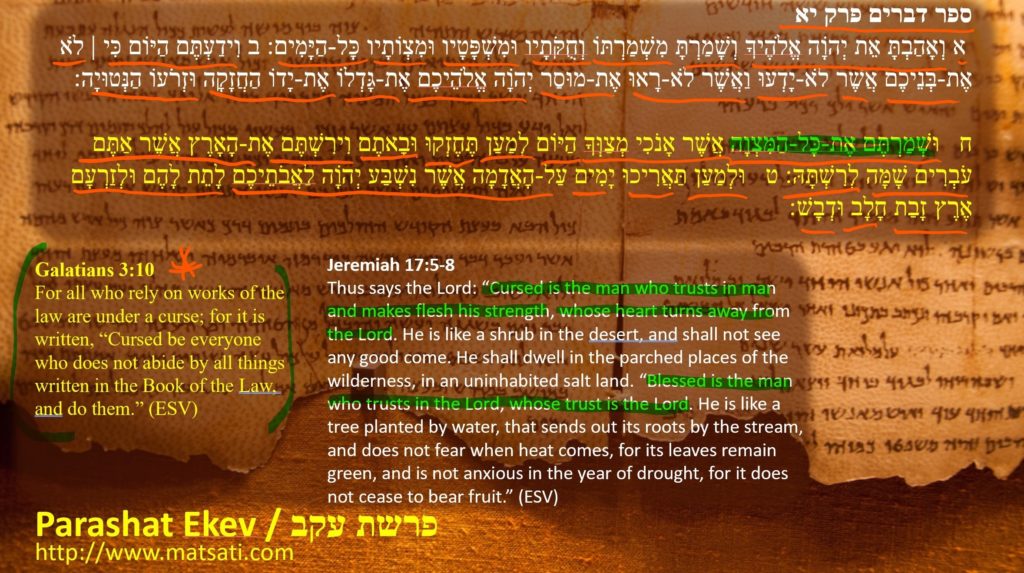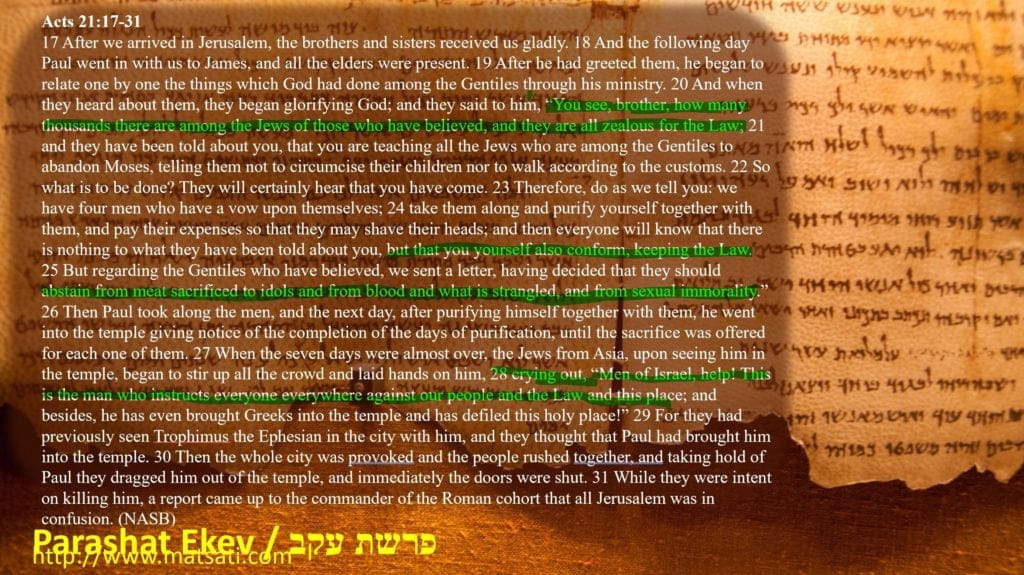In this week’s Torah Portion, Parashat Ekev, we read about the promises of God (Devarim / Deuteronomy 7:12-26), God’s gracious dealings with His people (Devarim / Deuteronomy 8:1-20), how Israel provoked God (Devarim / Deuteronomy 9:1-29), how Moshe made a second set of tablets for the Ten Commandments (Devarim / Deuteronomy 10:1-22), and we learn about the rewards for obedience (Devarim / Deuteronomy 11:1-25). In the opening passages for Parashat Ekev we read the following according to Dearim / Deuteronomy 7:12-13, יב וְהָיָה | עֵקֶב תִּשְׁמְעוּן אֵת הַמִּשְׁפָּטִים הָאֵלֶּה וּשְׁמַרְתֶּם וַעֲשִֹיתֶם אֹתָם וְשָׁמַר יְהֹוָה אֱלֹהֶיךָ לְךָ אֶת-הַבְּרִית וְאֶת-הַחֶסֶד אֲשֶׁר נִשְׁבַּע לַאֲבֹתֶיךָ: יג וַאֲהֵבְךָ וּבֵרַכְךָ וְהִרְבֶּךָ וּבֵרַךְ פְּרִי-בִטְנְךָ וּפְרִי-אַדְמָתֶךָ דְּגָנְךָ וְתִירשְׁךָ וְיִצְהָרֶךָ שְׁגַר-אֲלָפֶיךָ וְעַשְׁתְּרֹת צֹאנֶךָ עַל הָאֲדָמָה אֲשֶׁר-נִשְׁבַּע לַאֲבֹתֶיךָ לָתֶת לָךְ: 12 “Then it shall come about, because you listen to these judgments and keep and do them, that the Lord your God will keep His covenant with you and His faithfulness which He swore to your forefathers. 13 And He will love you, bless you, and make you numerous; He will also bless the fruit of your womb and the fruit of your ground, your grain, your new wine, and your oil, the newborn of your cattle and the offspring of your flock, in the land which He swore to your forefathers to give you. (NASB) If we consider these opening verses, are we to believe that if we do not keep the commands, the Lord will not keep His covenant and His faithfulness with us? This is exactly what is being said, and presents a serious issue with modern theologies that teach against the Torah and how we are not to live our lives by keeping the commands of God in the Messiah. Here the word עֵקֶב is the first distinctive word in the Torah portion, and thus became the word to describe this week’s Torah portion. Here עֵקֶב means “because” but it is also used to refer to “the very back, the end” עֵקֶב “right to the end” according to Tehillim / Psalms 119:33 or as “reward” which will be given at the end according to Tehillim / Psalms 119:112. Basically, in the first distinctive word we see this truth being taught, of the underlying motivation of our hearts to seek the Lord God in heaven, to love Him, and to serve Him (i.e. the Shema) and in doing so, God will keep His covenant with those who love Him. This is why Moshe wrote what he did saying, Devarim / Deuteronomy 7:9, וְיָ֣דַעְתָּ֔ כִּֽי־יְהוָ֥ה אֱלֹהֶ֖יךָ ה֣וּא הָֽאֱלֹהִ֑ים הָאֵל֙ הַֽנֶּאֱמָ֔ן שֹׁמֵ֧ר הַבְּרִ֣ית וְהַחֶ֗סֶד לְאֹהֲבָ֛יו וּלְשֹׁמְרֵ֥י מִצְוֺתוֹ לְאֶ֥לֶף דּֽוֹר׃ 7:9 Know therefore that the LORD your God is God; he is the faithful God, keeping his covenant of love to a thousand generations of those who love him and keep his commandments. (NASB) Here love (לְאֹהֲבָ֛יו) is connected to keeping the commands (וּלְשֹׁמְרֵ֥י מִצְוֺתוֹ). We notice the conjunction ו which means “and” so Moshe is saying those who love “and” keep the commands. If we look from a NT perspective, we understand when we walk according to the Spirit we do not sin, and we should see the Lord working through us to produce the fruit of the Spirit. If we are not producing the fruit of the Spirit, then we should question whether we are saved. I have made this statement before and have had the response that we are not to judge others. This is correct, as we are to judge ourselves, and how can we judge others since we have not walked in someone else’s footsteps! It is unfortunate that the first thing that comes to mind is that of judging others. The reason this becomes foremost in our thought is due to what we read both in the Scriptures, and how the Torah is lived out in some people’s lives as being so very critical of others, when that criticality should be turned inwardly and be used to seek and walk closer with/to the Lord personally! This is what Moshe was teaching us that if we will be among those who love Him, then He (God) will love us, and bless us, and multiply us as we read according to Devarim / Deuteronomy 7:13 (ג וַאֲהֵבְךָ וּבֵרַכְךָ וְהִרְבֶּךָ וּבֵרַךְ פְּרִי-בִטְנְךָ וּפְרִי-אַדְמָתֶךָ דְּגָנְךָ וְתִירשְׁךָ וְיִצְהָרֶךָ שְׁגַר-אֲלָפֶיךָ וְעַשְׁתְּרֹת צֹאנֶךָ עַל הָאֲדָמָה אֲשֶׁר-נִשְׁבַּע לַאֲבֹתֶיךָ לָתֶת לָךְ: 13 And He will love you, bless you, and make you numerous; He will also bless the fruit of your womb and the fruit of your ground, your grain, your new wine, and your oil, the newborn of your cattle and the offspring of your flock, in the land which He swore to your forefathers to give you. NASB). These things teach us that there is a great blessing when we humble ourselves before God and serve Him each day of our lives! Remember, pride is critical of others, humility before God does no such thing!

The Scriptures we are looking at for this week are from Devarim / Deuteronomy 7:12-16 and 11:1-12.
ספר דברים פרק ז
יב וְהָיָה | עֵקֶב תִּשְׁמְעוּן אֵת הַמִּשְׁפָּטִים הָאֵלֶּה וּשְׁמַרְתֶּם וַעֲשִֹיתֶם אֹתָם וְשָׁמַר יְהֹוָה אֱלֹהֶיךָ לְךָ אֶת-הַבְּרִית וְאֶת-הַחֶסֶד אֲשֶׁר נִשְׁבַּע לַאֲבֹתֶיךָ: יג וַאֲהֵבְךָ וּבֵרַכְךָ וְהִרְבֶּךָ וּבֵרַךְ פְּרִי-בִטְנְךָ וּפְרִי-אַדְמָתֶךָ דְּגָנְךָ וְתִירשְׁךָ וְיִצְהָרֶךָ שְׁגַר-אֲלָפֶיךָ וְעַשְׁתְּרֹת צֹאנֶךָ עַל הָאֲדָמָה אֲשֶׁר-נִשְׁבַּע לַאֲבֹתֶיךָ לָתֶת לָךְ: יד בָּרוּךְ תִּהְיֶה מִכָּל-הָעַמִּים לֹא-יִהְיֶה בְךָ עָקָר וַעֲקָרָה וּבִבְהֶמְתֶּךָ: טו וְהֵסִיר יְהוָֹה מִמְּךָ כָּל-חֹלִי וְכָל-מַדְוֵי מִצְרַיִם הָרָעִים אֲשֶׁר יָדַעְתָּ לֹא יְשִֹימָם בָּךְ וּנְתָנָם בְּכָל-שֹנְאֶיךָ: טז וְאָכַלְתָּ אֶת-כָּל-הָעַמִּים אֲשֶׁר יְהוָֹה אֱלֹהֶיךָ נֹתֵן לָךְ לֹא-תָחוֹס עֵינְךָ עֲלֵיהֶם וְלֹא תַעֲבֹד אֶת-אֱלֹהֵיהֶם כִּי-מוֹקֵשׁ הוּא לָךְ:
Devarim / Deuteronomy 7:12-16
12 “Then it shall come about, because you listen to these judgments and keep and do them, that the Lord your God will keep His covenant with you and His faithfulness which He swore to your forefathers. 13 And He will love you, bless you, and make you numerous; He will also bless the fruit of your womb and the fruit of your ground, your grain, your new wine, and your oil, the newborn of your cattle and the offspring of your flock, in the land which He swore to your forefathers to give you. 14 You shall be blessed above all peoples; there will be no sterile male or infertile female among you or among your cattle. 15 And the Lord will remove from you all sickness; and He will not inflict upon you any of the harmful diseases of Egypt which you have known, but He will give them to all who hate you. 16 You shall consume all the peoples whom the Lord your God will turn over to you; your eye shall not pity them, nor shall you serve their gods, for that would be a snare to you. (NASB)
ספר דברים פרק יא
א וְאָהַבְתָּ אֵת יְהוָֹה אֱלֹהֶיךָ וְשָׁמַרְתָּ מִשְׁמַרְתּוֹ וְחֻקֹּתָיו וּמִשְׁפָּטָיו וּמִצְוֹתָיו כָּל-הַיָּמִים: ב וִידַעְתֶּם הַיּוֹם כִּי | לֹא אֶת-בְּנֵיכֶם אֲשֶׁר לֹא-יָדְעוּ וַאֲשֶׁר לֹא-רָאוּ אֶת-מוּסַר יְהוָֹה אֱלֹהֵיכֶם אֶת-גָּדְלוֹ אֶת-יָדוֹ הַחֲזָקָה וּזְרֹעוֹ הַנְּטוּיָה: ג וְאֶת-אֹתֹתָיו וְאֶת-מַעֲשָֹיו אֲשֶׁר עָשָֹה בְּתוֹךְ מִצְרָיִם לְפַרְעֹה מֶלֶךְ-מִצְרַיִם וּלְכָל-אַרְצוֹ: ד וַאֲשֶׁר עָשָֹה לְחֵיל מִצְרַיִם לְסוּסָיו וּלְרִכְבּוֹ אֲשֶׁר הֵצִיף אֶת-מֵי יַם-סוּף עַל-פְּנֵיהֶם בְּרָדְפָם אַחֲרֵיכֶם וַיְאַבְּדֵם יְהֹוָה עַד הַיּוֹם הַזֶּה: ה וַאֲשֶׁר עָשָֹה לָכֶם בַּמִּדְבָּר עַד-בֹּאֲכֶם עַד-הַמָּקוֹם הַזֶּה: ו וַאֲשֶׁר עָשָֹה לְדָתָן וְלַאֲבִירָם בְּנֵי אֱלִיאָב בֶּן-רְאוּבֵן אֲשֶׁר פָּצְתָה הָאָרֶץ אֶת-פִּיהָ וַתִּבְלָעֵם וְאֶת-בָּתֵּיהֶם וְאֶת-אָהֳלֵיהֶם וְאֵת כָּל-הַיְקוּם אֲשֶׁר בְּרַגְלֵיהֶם בְּקֶרֶב כָּל-יִשְֹרָאֵל: ז כִּי עֵינֵיכֶם הָרֹאֹת אֵת כָּל-מַעֲשֵֹה יְהוָֹה הַגָּדֹל אֲשֶׁר עָשָֹה: ח וּשְׁמַרְתֶּם אֶת-כָּל-הַמִּצְוָה אֲשֶׁר אָנֹכִי מְצַוְּךָ הַיּוֹם לְמַעַן תֶּחֶזְקוּ וּבָאתֶם וִירִשְׁתֶּם אֶת-הָאָרֶץ אֲשֶׁר אַתֶּם עֹבְרִים שָׁמָּה לְרִשְׁתָּהּ: ט וּלְמַעַן תַּאֲרִיכוּ יָמִים עַל-הָאֲדָמָה אֲשֶׁר נִשְׁבַּע יְהוָֹה לַאֲבֹתֵיכֶם לָתֵת לָהֶם וּלְזַרְעָם אֶרֶץ זָבַת חָלָב וּדְבָשׁ: ס [ששי] י כִּי הָאָרֶץ אֲשֶׁר אַתָּה בָא-שָׁמָּה לְרִשְׁתָּהּ לֹא כְאֶרֶץ מִצְרַיִם הִוא אֲשֶׁר יְצָאתֶם מִשָּׁם אֲשֶׁר תִּזְרַע אֶת-זַרְעֲךָ וְהִשְׁקִיתָ בְרַגְלְךָ כְּגַן הַיָּרָק: יא וְהָאָרֶץ אֲשֶׁר אַתֶּם עֹבְרִים שָׁמָּה לְרִשְׁתָּהּ אֶרֶץ הָרִים וּבְקָעֹת לִמְטַר הַשָּׁמַיִם תִּשְׁתֶּה-מָּיִם: יב אֶרֶץ אֲשֶׁר-יְהוָֹה אֱלֹהֶיךָ דֹּרֵשׁ אֹתָהּ תָּמִיד עֵינֵי יְהוָֹה אֱלֹהֶיךָ בָּהּ מֵרֵשִׁית הַשָּׁנָה וְעַד אַחֲרִית שָׁנָה:
Devarim / Deuteronomy 11:1-12
1 “You shall therefore love the Lord your God, and always keep His directive, His statutes, His ordinances, and His commandments. 2 Know this day that I am not speaking with your sons who have not known and who have not seen the discipline of the Lord your God—His greatness, His mighty hand, His outstretched arm, 3 and His signs and His works which He did in the midst of Egypt to Pharaoh the king of Egypt and to all his land; 4 and what He did to Egypt’s army, to its horses and its chariots, when He made the water of the Red Sea engulf them while they were pursuing you, and the Lord completely eliminated them; 5 and what He did to you in the wilderness, until you came to this place; 6 and what He did to Dathan and Abiram, the sons of Eliab, the son of Reuben, when the earth opened its mouth and swallowed them, their households, their tents, and every living thing that followed them, among all Israel— 7 but your own eyes have seen all the great work of the Lord which He did. 8 “You shall therefore keep every commandment which I am commanding you today, so that you may be strong and go in and take possession of the land into which you are about to cross to possess it; 9 and so that you may prolong your days on the land which the Lord swore to your fathers to give to them and to their descendants, a land flowing with milk and honey. 10 For the land, into which you are entering to possess it, is not like the land of Egypt from which you came, where you used to sow your seed and water it by your foot like a vegetable garden. 11 But the land into which you are about to cross to possess it, a land of hills and valleys, drinks water from the rain of heaven, 12 a land for which the Lord your God cares; the eyes of the Lord your God are continually on it, from the beginning even to the end of the year. (NASB)
The rabbis say the reason Moshe wrote what he did saying, וְהָיָה | עֵקֶב תִּשְׁמְעוּן “it will be the end result / consequence of your listening” using the word עֵקֶב which has the meaning of “heel” was that he was using this word to refer to the kind of commands that the average person tramples underfoot with one’s feet. (see Daat Zkhenim and Rashi on 7:12) The rabbis point out the kind of mitzvot (commands) that Moshe is speaking of as trampling upon are those that take no effort to fulfill. This can be illustrated best by a parable.
“A king had an orchard; he brought workmen to that orchard to plant trees and did not tell them how much he would pay each for each tree that they planted. If he had told them beforehand which planting would be paid for most, he would find at the end that only half the orchard had been planted with trees, as the workers would, of course, all plant the trees for which they would be paid the most. According to Rabbi Shimon ben Yochai, G–d revealed the reward of only two of all the commandments; one is the commandment which is the easiest to fulfill, the other is the commandment which is the hardest to fulfill.” (Daat Zkenim on Deuteronomy 7:12 Part 1)
The rabbis are discussing the commands in terms of what is easiest, such as honoring father and mother (Shemot / Exodus 20:12) according to the Ten commandments. The other command being referenced is that of the command against sending away the mother bird in order to take her eggs or her newly hatched chicks. (Devarim / Deuteronomy 22:6) These are considered easy commands. (Note that for those who have had abusive parents, this command may be considerably more difficult to fulfill.) Both of these are considered equal in their weightiness due to the Scriptures saying the one who fulfills them is rewarded with a long life. The reason these two commands are given the reward of “long life” was due to the Lord God showing us that all of the commands are important as a faithful people to God.
Moshe writes according to Devarim / Deuteronomy 11:1-2 saying, א וְאָהַבְתָּ אֵת יְהוָֹה אֱלֹהֶיךָ וְשָׁמַרְתָּ מִשְׁמַרְתּוֹ וְחֻקֹּתָיו וּמִשְׁפָּטָיו וּמִצְוֹתָיו כָּל-הַיָּמִים: ב וִידַעְתֶּם הַיּוֹם כִּי | לֹא אֶת-בְּנֵיכֶם אֲשֶׁר לֹא-יָדְעוּ וַאֲשֶׁר לֹא-רָאוּ אֶת-מוּסַר יְהוָֹה אֱלֹהֵיכֶם אֶת-גָּדְלוֹ אֶת-יָדוֹ הַחֲזָקָה וּזְרֹעוֹ הַנְּטוּיָה: 1 “You shall therefore love the Lord your God, and always keep His directive, His statutes, His ordinances, and His commandments. 2 Know this day that I am not speaking with your sons who have not known and who have not seen the discipline of the Lord your God—His greatness, His mighty hand, His outstretched arm, (NASB) Moshe goes on to describe the significance of his statement speaking of (i) the signs and wonders God performed in Egypt and what God did to the Egyptian army, and (ii) of Datan, Aviram, and Reuben being consumed by the earth due to their sin and rebellion. He goes on saying, ח וּשְׁמַרְתֶּם אֶת-כָּל-הַמִּצְוָה אֲשֶׁר אָנֹכִי מְצַוְּךָ הַיּוֹם לְמַעַן תֶּחֶזְקוּ וּבָאתֶם וִירִשְׁתֶּם אֶת-הָאָרֶץ אֲשֶׁר אַתֶּם עֹבְרִים שָׁמָּה לְרִשְׁתָּהּ: ט וּלְמַעַן תַּאֲרִיכוּ יָמִים עַל-הָאֲדָמָה אֲשֶׁר נִשְׁבַּע יְהוָֹה לַאֲבֹתֵיכֶם לָתֵת לָהֶם וּלְזַרְעָם אֶרֶץ זָבַת חָלָב וּדְבָשׁ: 8 “You shall therefore keep every commandment which I am commanding you today, so that you may be strong and go in and take possession of the land into which you are about to cross to possess it; 9 and so that you may prolong your days on the land which the Lord swore to your fathers to give to them and to their descendants, a land flowing with milk and honey. (NASB) Moshe writes וּשְׁמַרְתֶּם אֶת-כָּל-הַמִּצְוָה “and you shall keep His command” expressing that we are to protect the things God considers important for a holy people. For example, being righteous towards strangers (Tehillim / Psalms 146:9), being gracious to the poor and destitute (Mishley / Proverbs 19:17), and to execute justice for the fatherless and the widow (Devarim / Deuteronomy 27:19). It is also said elsewhere that we are to keep the charge of God to walk in His ways (1 Kings 2:3), and the rabbis say “just as He is gracious and merciful, so you also are to be gracious and merciful.” (Shemot / Exodus 34:6, Talmud Bavli Shabbat 133b) This is the significance of the blessing and the curses that are listed in the Torah. The reference to the commands as a blessing are to those who do them, and the curse is to those who mock them. So when we take a look at the Apostolic Writings, we read the following according to Galatians 3:10:

Galatians 3:10
For all who rely on works of the law are under a curse; for it is written, “Cursed be everyone who does not abide by all things written in the Book of the Law, and do them.” (ESV)
So when Moshe speaks about the commands as we read in Devarim / Deuteronomy 7:12-13, יב וְהָיָה | עֵקֶב תִּשְׁמְעוּן אֵת הַמִּשְׁפָּטִים הָאֵלֶּה וּשְׁמַרְתֶּם וַעֲשִֹיתֶם אֹתָם וְשָׁמַר יְהֹוָה אֱלֹהֶיךָ לְךָ אֶת-הַבְּרִית וְאֶת-הַחֶסֶד אֲשֶׁר נִשְׁבַּע לַאֲבֹתֶיךָ: יג וַאֲהֵבְךָ וּבֵרַכְךָ וְהִרְבֶּךָ וּבֵרַךְ פְּרִי-בִטְנְךָ וּפְרִי-אַדְמָתֶךָ דְּגָנְךָ וְתִירשְׁךָ וְיִצְהָרֶךָ שְׁגַר-אֲלָפֶיךָ וְעַשְׁתְּרֹת צֹאנֶךָ עַל הָאֲדָמָה אֲשֶׁר-נִשְׁבַּע לַאֲבֹתֶיךָ לָתֶת לָךְ: 12 “Then it shall come about, because you listen to these judgments and keep and do them, that the Lord your God will keep His covenant with you and His faithfulness which He swore to your forefathers. 13 And He will love you, bless you, and make you numerous; He will also bless the fruit of your womb and the fruit of your ground, your grain, your new wine, and your oil, the newborn of your cattle and the offspring of your flock, in the land which He swore to your forefathers to give you. (NASB) Is Moshe speaking of relying upon the works of the Law? What are we supposed to do when we are being told in the Torah about the importance of the command, listening, and obeying, and to Paul’s approach who says that it is difficult and impossible to always obey the commands of God? I feel these things are brought into context based upon what Jeremiah says according to Jeremiah 17:5-8.
Jeremiah 17:5-8
Thus says the Lord: “Cursed is the man who trusts in man and makes flesh his strength, whose heart turns away from the Lord. He is like a shrub in the desert, and shall not see any good come. He shall dwell in the parched places of the wilderness, in an uninhabited salt land. “Blessed is the man who trusts in the Lord, whose trust is the Lord. He is like a tree planted by water, that sends out its roots by the stream, and does not fear when heat comes, for its leaves remain green, and is not anxious in the year of drought, for it does not cease to bear fruit.” (ESV, ה כֹּה | אָמַר יְהֹוָה אָרוּר הַגֶּבֶר אֲשֶׁר יִבְטַח בָּאָדָם וְשָֹם בָּשָֹר זְרֹעוֹ וּמִן-יְהֹוָה יָסוּר לִבּוֹ: ו וְהָיָה כְּעַרְעָר בָּעֲרָבָה וְלֹא יִרְאֶה כִּי-יָבוֹא טוֹב וְשָׁכַן חֲרֵרִים בַּמִּדְבָּר אֶרֶץ מְלֵחָה וְלֹא תֵשֵׁב: ז בָּרוּךְ הַגֶּבֶר אֲשֶׁר יִבְטַח בַּיהֹוָה וְהָיָה יְהֹוָה מִבְטַחוֹ: ח וְהָיָה כְּעֵץ | שָׁתוּל עַל-מַיִם וְעַל-יוּבַל יְשַׁלַּח שָׁרָשָׁיו וְלֹא יִרְאֶ [יִרְאֶה] כִּי-יָבֹא חֹם וְהָיָה עָלֵהוּ רַעֲנָן וּבִשְׁנַת בַּצֹּרֶת לֹא יִדְאָג וְלֹא יָמִישׁ מֵעֲשֹוֹת פֶּרִי:)
What is interesting about Jeremiah chapter 17, is that both before and after Jeremiah 17:5-8, the Lord God describes how great is the sin of Judah and the sin of all men. He says, “The sin of Judah is written with a pen of iron; with the point of a diamond it is engraved on the tablet of their heart,” which is to say, the sins of men are quite difficult to overcome. The writing with a pen of iron is a description of sin which is deeply embedded in the soul, so much so that it becomes a way of life leading to destruction. Jeremiah says, אָרוּר הַגֶּבֶר אֲשֶׁר יִבְטַח בָּאָדָם “cursed is the man who trusts in man.” This is analogous to, “cursed is the man who trusts in his own righteousness,” because he thinks that he will be able to stand at the final Judgment. In the olam haba (world to come) what will a man do who trusts in himself? To whom would he turn when he looks for an assurance of righteousness (salvation)? What happens when one fails to live an upright life? This is why Jeremiah continues saying “Blessed is the man who trusts in the Lord, whose trust is the Lord” because we need the Lord God, His faithfulness and His mercy and grace!
Now concerning these things, having a zeal for the Torah, there is something very interesting we read in Acts 21.

Acts 21:17-31
17 After we arrived in Jerusalem, the brothers and sisters received us gladly. 18 And the following day Paul went in with us to James, and all the elders were present. 19 After he had greeted them, he began to relate one by one the things which God had done among the Gentiles through his ministry. 20 And when they heard about them, they began glorifying God; and they said to him, “You see, brother, how many thousands there are among the Jews of those who have believed, and they are all zealous for the Law; 21 and they have been told about you, that you are teaching all the Jews who are among the Gentiles to abandon Moses, telling them not to circumcise their children nor to walk according to the customs. 22 So what is to be done? They will certainly hear that you have come. 23 Therefore, do as we tell you: we have four men who have a vow upon themselves; 24 take them along and purify yourself together with them, and pay their expenses so that they may shave their heads; and then everyone will know that there is nothing to what they have been told about you, but that you yourself also conform, keeping the Law. 25 But regarding the Gentiles who have believed, we sent a letter, having decided that they should abstain from meat sacrificed to idols and from blood and what is strangled, and from sexual immorality.” 26 Then Paul took along the men, and the next day, after purifying himself together with them, he went into the temple giving notice of the completion of the days of purification, until the sacrifice was offered for each one of them. 27 When the seven days were almost over, the Jews from Asia, upon seeing him in the temple, began to stir up all the crowd and laid hands on him, 28 crying out, “Men of Israel, help! This is the man who instructs everyone everywhere against our people and the Law and this place; and besides, he has even brought Greeks into the temple and has defiled this holy place!” 29 For they had previously seen Trophimus the Ephesian in the city with him, and they thought that Paul had brought him into the temple. 30 Then the whole city was provoked and the people rushed together, and taking hold of Paul they dragged him out of the temple, and immediately the doors were shut. 31 While they were intent on killing him, a report came up to the commander of the Roman cohort that all Jerusalem was in confusion. (NASB)
We notice how the disciples explain to Paul how zealous the others were for Yeshua and Torah. The idea of keeping the Commands and having faith in Yeshua are not opposites. The context of Acts 21 has Paul going to the Temple and performing the prescribed sacrifices to conclude a Nazarite vow (note this includes a sin offering, a whole burnt offering, etc). It was at this point those who were in the Temple in Jerusalem and zealous for Torah state the following according to Acts 21:28 crying out, “Men of Israel, help! This is the man who instructs everyone everywhere against our people and the Law and this place; and besides, he has even brought Greeks into the temple and has defiled this holy place!” (NASB) note that Paul was there for the purpose of proving he was not “teaching the Gentiles to abandon Moshe.” There is a word play here where Moshe is synonymous to the Torah. Note also how these men who took Paul would also be considered zealous for Torah. The difference is these men were trying to kill him, and so it appears as if they were walking in Torah in a way that leads to destruction as opposed to life. I have acquaintances on the internet who have a zeal for the Torah and they use that zeal to judge others concerning the commands, judging or damning souls due to their “lack” of obedience. Our Zeal for God’s Word should not be used to judge others, as I had said earlier, one would have to walk in another man’s footsteps in order to do so. This isn’t about providing an allowance for disobedience, but illustrates where one’s focus is meant to be as examining ourselves, this is on a personal level, as to whether we are trusting in the Lord or trusting in ourselves. (i.e. Jeremiah 17) The Scriptures say that we are to trust the Lord, to seek Him and His Messiah, that even the Messiah stands at the door and knocks! (Revelation 3:20) We are to open that door and invite Him in! For those who are always concerned about someone else’s obedience to the Torah, you walk a very dangerous road my friend!









